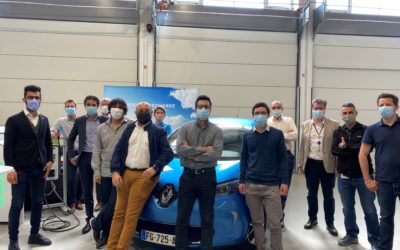Weakly supervised learning in the context of autonomous vehicle perception : Florent Chiaroni defended his thesis
VEDECOM is pleased to announce that Florent Chiaroni successfully defended his thesis entitled “Weakly supervised learning in the context of autonomous vehicle perception”.
The thesis defence took place on Monday, the 3rd of February 2020, at Centrale Supelec.
JURY
Yap-Peng TAN, Professor, Nanyang Technological University (NTU), Singapore – Rapporteur
Hichem SAHBI, Research Fellow CNRS (HDR), UPMC Sorbonne Université (LIP6) – Rapporteur
Jean-Luc DUGELAY, Professor, EURECOM – Examinateur
Samia BOUCHAFA, Professor, Université d’Evry Val-d’Essonne (IBISC) – Examiner
Camille COUPRIE, Researcher, FACEBOOK (FAIR) – Examiner
Frédéric DUFAUX, Research Director CNRS, CentraleSupelec (L2S) – Thesis Supervisor
Mohamed-Cherif RAHAL, Researcher, Institut VEDECOM – Thesis co-supervisor (référent VEDECOM)
Nicolas HUEBER, Researcher, Institut Saint-Louis Franco-Allemand ISL (ELSI) – Thesis co-supervisor
Féthi BEN OUEZDOU, Professor, Université de Versailles Saint-Quentin en Yvelines (LISV) – Guest
ABSTRACT
In the context of autonomous vehicle perception applications, the interest of the research community for deep learning approaches has continuously grown since the last decade. This can be explained by the fact that deep learning techniques provide nowadays while requiring only low-cost vision sensors. More specifically, deep learning techniques can provide, from a monocular camera sensor, rich semantic information concerning the complex visual patterns encountered in autonomous driving scenarios. However, such approaches require, as their name implies, to learn on data. In particular, state-of-the-art prediction performances on discriminative tasks often demand hand labeled data of the target application domain. Hand labeling has a significant cost, while, conversely, unlabeled data can be easily obtained in the autonomous driving context. It turns out that a category of learning strategies, referred to as weakly supervised learning, enables to exploit partially labeled data. Therefore, we aim in this thesis at reducing as much as possible the hand labeling requirement by proposing weakly supervised learning techniques.
We start by presenting a type of learning methods which are self-supervised. They consist in substituting hand-labels by upstream techniques able to automatically generate exploitable training labels. Self-supervised learning (SSL) techniques have proven their usefulness in the past for off road obstacles avoidance and path planning through changing environments, by learning at the application time. More recently, they have also been applied for depth map estimation, asphalt road segmentation, and moving obstacles instance segmentation and tracking. However, SSL techniques still leave the door open for detection, segmentation, and classification of static potentially moving obstacles. For instance, the latter can be motionless cars at a road intersection, or pedestrians waiting to cross the street. Consequently, we propose in this thesis three novel weakly supervised learning methods using generative adversarial networks, with the final goal to deal with such road users through an SSL framework.
The first two proposed contributions of this work aim at datasets, such that the labeling effort can be focused only on our class of interest, the positive class. Then, we propose an approach which can deal with training data containing a high fraction of wrong labels, referred to as noisy labels. Next, we propose to demonstrate the potential of such weakly supervised image classification strategies for the two following real application tasks: detection and segmentation of potentially moving obstacles.
Finally, we draw a conclusion on this thesis research work, followed by future research perspectives in order to motivate further investigations towards the proposed directions.
Articles récents :
European 5G-MOBIX Project French site Demonstration and Seminar
5G for connected and automated cooperative mobility: towards greater safety and efficiency 21 April 2022, 9 AM - 6 PM Organisation : VEDECOM, Catapult, AKKA Technologies and VALEO Location: VEDECOM headquarters at mobiLab and Satory tracks, Versailles. 23 bis allée...
E-mobility: a successfull demonstration of the Certificate Trust List for Plug & Charge interoperability
The Certificate Trust List has been demonstrated on the 2nd of June 2021 as a technical solution for ISO 15118 Plug and Charge interoperability. The objective is to simplify the user experience wherever he is and guarantee the interoperability between any vehicle and...
“Machine Learning for the distributed and dynamic management of a fleet of autonomous taxis and shuttles”
Thesis defence of Tatiana BABICHEVA « Machine Learning for the distributed and dynamic management of a fleet of autonomous taxis and shuttles » 10 mars 2021 - 9h30 Online : Zoom Follow this event : [button...



